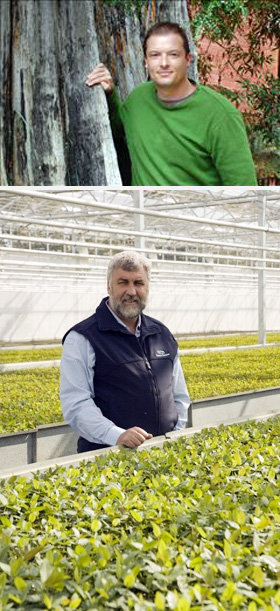Old habits ensure that the forest divide remains as wide as ever, but it doesn’t have to be like this [3 April 2012 | Peter Boyer]

TOP: Martin Moroni. BOTTOM: Bob Gordon in a happier moment at Forestry Tasmania’s Perth Forest Nursery, July 2011. PHOTOS Forestry Tasmania
Dr Martin Moroni is becoming a prominent face of Forestry Tasmania.
Since his appointment as Forestry Tasmania’s forest carbon scientist in late 2009, he’s spoken to some 2000 people at gatherings around the state about why we should support our forest industry.
He’s been cited in media reports and appeared on radio to tell us that if we want to retain tree carbon, managed forests as we have in Tasmania are much better than unmanaged ones, as you presumably would have in reserves.
Last week he was at it again, spruiking the position that a viable, fully-resourced forestry industry in Tasmania, besides maximising forest carbon storage, could also bring us brand new wood products and, if we ever need it, a biomass energy resource more environmentally friendly than oil.
When I went to listen to Moroni at Forestry Tasmania, I didn’t expect a lot from the occasion. Hearing a couple of his presentations before, I’d thought his role had been more public relations than science, something every outsider should be alert to.
I was once employed for 12 months at the then Forestry Commission, starting in the year Bob Brown got arrested at Farmhouse Creek. I learned a lot about forests from that experience just as I learned a lot about Antarctica from subsequent work, But another lesson from those years is how a PR focus can sometimes skew reality.
I expected Moroni to present his employer in a favourable light. There was some of this, including statements about Forestry Tasmania’s big net contribution to the state’s economy, which I’d class as a “company claim” that warrants further scrutiny. But there were also some pleasant surprises.
One was the range of products that Tasmanian forestry might produce, developed in China with support from Forestry Tasmania. Reinforced structural beams, furniture and flooring timber made from wood residues are a few of the possibilities; soft fabric (surprise!) is another. This deserves applause.
On the pressing question of how we should manage Tasmanian forests for carbon, Moroni provided information — some of it new to me — about variations in carbon content according to the age of a forest, the tree species it contains, and the over-arching, unavoidable threat of once-in-a-century wildfires.
He agreed that Forestry Tasmania has a responsibility to provide data and analysis on carbon stocks and flows in Tasmanian forests. He could have responded hotly to a question about the conservation report for Professor Jonathan West’s Independent Verification Group (IVG), but he didn’t, saying it was long (it is indeed) and that he hadn’t yet read it fully.
All this was a big change from an encounter I had with Forestry Tasmania in 2009. I got no answer to what I thought were reasonable questions about forest carbon analysis, enduring instead over an hour of hectoring from a couple of overheated executives that ended with something like “Trust us, we know what’s best.”
Moroni aside, as far as I can see the gulf between conservationists and government forest managers (leaving out the industry, which just wants to survive) is as wide today as it ever was. Perhaps it’s ideological, but it also contains a lot of political power-plays, professional pride and old history.
For all his high-flown ambitions, Jonathan West’s IVG report doesn’t look like being the salve it might have been. For a start, its delivery to government and its public release have been obviously rushed, with some documents appearing incomplete or superfluous.
And then there’s West’s much-criticised statement that Tasmania’s native forests are being harvested “substantially above long-term sustainable yield”. West said that Forestry Tasmania’s own data had shown that its contract commitments were up to double the sustainable yield.
I checked West’s statement against the report by Melbourne University forest scientists, which says that total demand to 2030 cannot be met from native forests alone and that “significant volumes will have to be sourced from plantations and/or private land if current demand is to be satisfied”.
That seems similar to what West is saying, but there’s a lot of technical data involved here that I’m unqualified to judge.
Bob Gordon, Forestry Tasmania’s managing director, was under no such constraint. He told ABC Drive’s Garry Bailey that West seemed to have “completely misunderstood” the Melbourne report, adding “it’s not the first time Professor West has misunderstood some of these things.”
He went on to tell a story about how West has been proven wrong in last year’s Kelty inquiry, throwing in complaints about how he’d failed to reply to Forestry Tasmania’s correspondence and failed to acknowledge its contribution to recommendations about finding a solution.
If West is wrong about sustainability levels he deserves to be criticised, but whatever advantage Gordon might have enjoyed he lost in the way he put his case on radio. This came across as an organisation under siege. With a smidgin more grace under pressure, Gordon could so easily have seized the higher ground.
The political pugilists took up the fight, starting with Liberal MP Peter Gutwein’s assertion that West was unfit to do the review. The Greens and their environmental fellow-travellers, who have their own history of picking fights, enjoyed a rare moment of appearing to be above the fray.
What really matters here isn’t the particular point at issue. It’s the sad fact that, once again, the best defence is seen as attack. Often it isn’t. If you want to end a war, being polite to one’s enemies is always the best option.
• The ability of others to embrace their enemies will be put to the test in a public discussion tonight about the future of Forestry Tasmania, at Hadleys Hotel, Hobart, from 6 pm.
